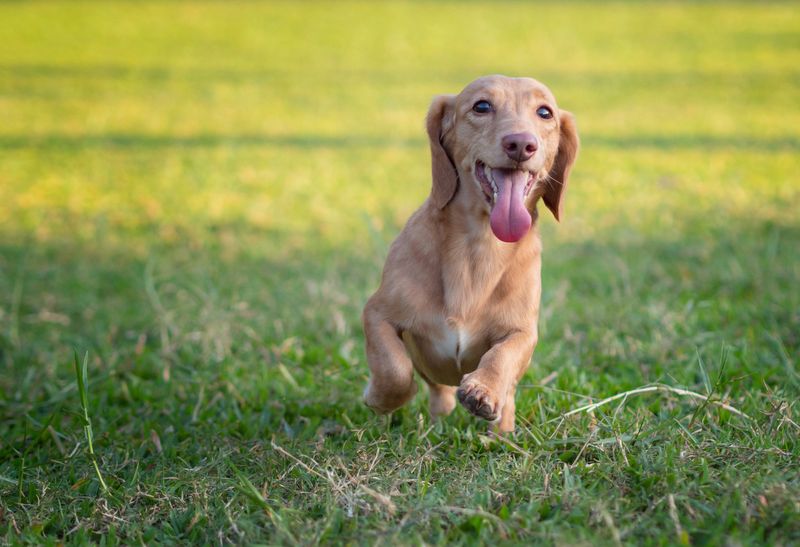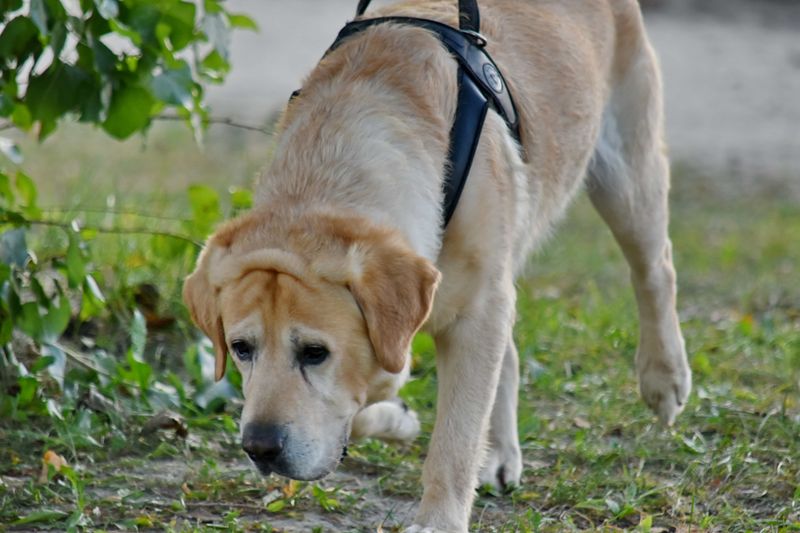Managing diet for dogs with high food motivation can be challenging. Here are 13 breeds known for their food obsession, requiring careful feeding to maintain health.
Beagle
Beagles are notorious for their exceptional sense of smell and relentless food hunting. These curious pups can sniff out treats from miles away.
Despite their small size, Beagles need careful monitoring to prevent overeating. Regular exercise combined with measured meals can prevent unwanted weight gain.
These dogs have a history of being used in hunting, which contributes to their food-driven nature. Owners must be vigilant when it comes to leaving food unattended around these determined sniffers.
Dachshund
The long-bodied Dachshund, with its charming personality, is often very food-motivated. Their low stature and curious nature make them adept at sneaking snacks.
Overfeeding can lead to back problems, a common issue for this breed. Ensuring they have a balanced diet and regular exercise is vital.
Dachshunds were originally bred for hunting small game, which explains their keen interest in food. Owners should use treats judiciously during training to avoid excessive weight.
Cocker Spaniel
Cocker Spaniels have a gentle demeanor paired with a strong desire for food. Their expressive eyes can make it hard to resist giving them extra treats.
However, maintaining a strict feeding schedule is necessary to prevent weight issues. Providing them with healthy snacks can satisfy their cravings without compromising health.
Historically, these dogs were used as bird hunters, which may contribute to their food obsession. Balancing indulgence with discipline ensures they stay fit and happy.
Pug
Pugs are known for their adorable wrinkles and even more adorable appetite. Their love for food is matched only by their love for lounging.
Due to their small size, pugs are prone to obesity, requiring careful portion control. Interactive feeding toys can provide mental stimulation and slow eating.
These little companions have been cherished by royalty, and their playful nature often leads them to seek treats. Ensuring a balanced diet is key to avoiding weight-related health issues.
Bulldog
Bulldogs are a breed with a notorious love for lounging and a strong affinity for food. Their laid-back nature makes them easy to overfeed.
It’s important to manage their diet carefully to prevent weight-related health problems. Regular walks can help keep them in shape.
Did you know? Bulldogs were originally bred for bull-baiting, but today they are more likely to be found snuggled on the couch. Balancing food and exercise helps maintain their health.
Basset Hound
Basset Hounds boast a keen sense of smell and a love for food, traits that make them excellent trackers. Their droopy eyes often lead to extra treats from unsuspecting owners.
However, their low energy levels mean they can gain weight quickly if not monitored. A balanced diet and regular walks are essential.
These dogs were bred for hunting small game, which explains their food-driven behavior. Owners need to be cautious with food portions to keep these hounds healthy.
Labrador Retriever
Labrador Retrievers are known for their insatiable appetite. Their love for food is almost as big as their love for family. This breed often struggles with weight management, posing a challenge for their owners.
To keep their weight in check, portion control is essential. An engaging routine with puzzle feeders can help slow their eating pace.
Did you know? Labradors have a gene mutation that makes them prone to obesity. This genetic predisposition makes a strict feeding schedule crucial for their well-being.
Boxer
Boxers are lively, affectionate dogs with a zest for life and an equally strong passion for food. Their athletic build can be deceptive when it comes to their dietary needs.
To maintain their energy and avoid obesity, a balanced diet and plenty of exercise are necessary. Portion control is crucial for these energetic companions.
Boxers were originally bred as working dogs, renowned for their strength and agility. Managing their food intake ensures they remain the healthy, playful dogs they’re known to be.
Golden Retriever
Golden Retrievers are often synonymous with loyalty and an undeniable love for food. Their friendly nature can sometimes lead them to overindulge.
These dogs need a balanced diet to support their active lifestyle. Using engaging feeding methods can help control their eating speed.
Golden Retrievers were bred as hunting companions, which explains their energetic and food-motivated behavior. A disciplined feeding routine keeps them in top shape and health.
Pomeranian
Pomeranians, with their fluffy coats and spirited personalities, are often surprisingly food-focused. Despite their small stature, they have big appetites.
Overeating can lead to obesity, a common issue for this breed. Careful portion management and healthy snacks are key to maintaining their health.
These little dogs hail from sled-pulling ancestors, which might contribute to their hearty appetites. Ensuring they have a balanced diet helps them remain energetic and lively.
Chihuahua
Chihuahuas are small dogs with big personalities, and their love for food is equally outsized. Their tiny size makes portion control vital to avoid weight issues.
These dogs require a diet that supports their energetic lifestyle without overfeeding. Interactive toys can help manage their food intake.
Chihuahuas have a rich history as companions to ancient civilizations, and their spirited nature often leads to treat-seeking behavior. A structured feeding routine keeps them healthy and happy.
Shih Tzu
Shih Tzus are known for their luxurious coats and a fondness for food. Their affectionate nature often results in extra treats from doting owners.
However, maintaining a healthy weight is crucial for this breed. Balanced meals and regular grooming go hand in hand to ensure their well-being.
These dogs were originally bred as companions for Chinese royalty, which might explain their indulgent eating habits. Careful feeding helps them maintain their regal appearance and health.
Yorkshire Terrier
Yorkshire Terriers may be small, but their enthusiasm for food is mighty. Their inquisitive nature often leads them on a quest for treats.
Controlling their portions is essential to prevent obesity, a common issue in small breeds. Regular exercise and a nutritious diet support their lively temperament.
These little dogs were originally bred for catching rats in textile mills, which contributes to their active and food-driven behavior. A disciplined feeding plan ensures they remain sprightly and healthy.













